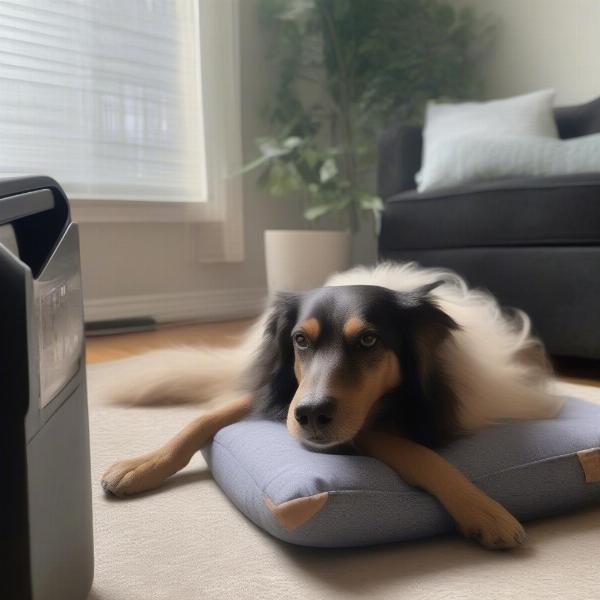Reactive dog training in Chicago is crucial for fostering a harmonious relationship between you and your furry friend, as well as ensuring the safety and well-being of your dog and others. Understanding the root causes of reactivity, coupled with consistent training techniques, can significantly improve your dog’s behavior and reduce their anxiety in triggering situations. This guide explores various aspects of reactive dog training in the Windy City, from finding the right trainer to implementing effective strategies at home.
Understanding Canine Reactivity
Canine reactivity isn’t simply “bad behavior.” It’s often a fear-based response to perceived threats, resulting in barking, lunging, or growling. Triggers can vary widely, from other dogs and people to specific sounds or objects. Identifying these triggers is the first step towards effective reactive dog training. In a bustling city like Chicago, with its diverse environments and constant stimulation, understanding and managing reactivity is particularly important.
Finding the Right Reactive Dog Trainer in Chicago
Chicago boasts a plethora of dog trainers, but not all specialize in reactivity. Look for certified professionals with experience in positive reinforcement methods. Avoid trainers who advocate punishment-based techniques, as these can exacerbate reactivity. Seek recommendations from your veterinarian, local dog groups, or online forums dedicated to reactive dog training in Chicago.
Key Training Techniques for Reactive Dogs
Positive reinforcement forms the cornerstone of successful reactive dog training. This involves rewarding desired behaviors, such as staying calm in the presence of triggers, with treats, praise, or toys. Desensitization and counter-conditioning are also crucial. Desensitization gradually exposes the dog to diluted versions of their triggers, while counter-conditioning pairs the trigger with a positive experience, like receiving a treat.
Managing Reactivity in Chicago’s Urban Environment
Navigating Chicago with a reactive dog requires careful planning and management. Choose walking routes that minimize exposure to triggers. Utilize tools like front-clip harnesses or head halters to maintain control. Always carry high-value treats to reward calm behavior. Be mindful of your dog’s body language and avoid pushing them beyond their comfort zone. Consider enrolling in group classes specifically designed for reactive dogs in Chicago, which provide a controlled environment for practicing newly learned skills.
Creating a Safe and Supportive Home Environment
A calm and predictable home environment is essential for reactive dogs. Provide a dedicated safe space where your dog can retreat when feeling overwhelmed. Enrichment activities, such as puzzle toys and chew bones, can help reduce stress and anxiety. Maintaining a consistent routine, including feeding times and walks, contributes to a sense of security.
 Reactive Dog in a Chicago Home
Reactive Dog in a Chicago Home
What to Expect from Reactive Dog Training
Reactive dog training is a journey, not a quick fix. Consistency and patience are key. Progress may be gradual, with setbacks along the way. Celebrate small victories and remember that each dog learns at their own pace. With dedication and the right approach, you can help your reactive dog thrive in the vibrant city of Chicago.
Conclusion
Reactive dog training in Chicago is an investment in your dog’s well-being and the quality of your life together. By understanding the underlying causes of reactivity, employing positive reinforcement techniques, and managing your dog’s environment, you can empower them to navigate the urban landscape with confidence and ease.
FAQ
-
How long does reactive dog training typically take? The duration of training varies depending on the dog’s individual needs and the severity of their reactivity. It’s a long-term commitment requiring ongoing management.
-
What are the signs of a reactive dog? Common signs include barking, lunging, growling, whining, and excessive panting in response to specific triggers.
-
Can medication help with reactive dog training? In some cases, medication prescribed by a veterinarian can help manage anxiety and make training more effective.
-
Are group classes suitable for reactive dogs? Specialized group classes designed for reactive dogs can be beneficial, offering a controlled environment for socialization and training.
-
Is it possible to fully “cure” reactivity? While reactivity may not be completely eradicated, with consistent training and management, significant improvements can be achieved, leading to a happier and more relaxed dog.
-
What should I do if my reactive dog has an outburst in public? Create distance from the trigger, remain calm, and use positive reinforcement to redirect your dog’s attention.
-
How do I find a qualified reactive dog trainer in Chicago? Seek recommendations from your veterinarian, local dog groups, or online forums dedicated to reactive dog training in Chicago.
Dog friendly restaurants little rock might provide some insight into finding dog-friendly establishments, while dog friendly hotel pembrokeshire offers information on dog-friendly accommodations. For those looking for walking holidays, dog walking holidays uk provides relevant resources. If you’re planning a trip to Wales, places to stay in wales with dogs and self catering tenby dog friendly can help you find suitable dog-friendly lodgings.
ILM Dog is your trusted resource for all things canine. We offer expert advice on dog breeds, health, training, nutrition, grooming, and more. Our aim is to provide valuable information to dog owners worldwide, empowering them to provide the best possible care for their beloved companions. For professional guidance on reactive dog training or any other dog-related inquiries, contact our team at [email protected] or call us at +44 20-3965-8624.